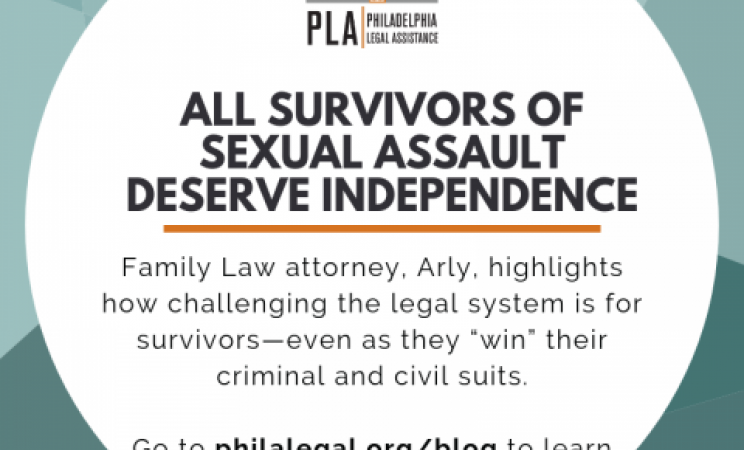All Sexual Assault Survivors Deserve Independence

As an attorney in the Family Law Unit at Philadelphia Legal Assistance, I work with survivors of violence who are seeking a new life for themselves and their children. I provide them the tools necessary to get custody of their children and protection from abuse orders so that they are better able to build a life of their choosing—one that is based in a loving home free of intimidation and violence. My work is incredibly rewarding, yet through it, I witness some of the greatest challenges an individual can face.
Our systems of justice are ill-equipped to support survivors despite the fact that over 60% of women will face sexual violence in their lifetime—a number which fails to do justice for survivors across the gender spectrum who never report assault due to fear, intimation, or shame. Pursuing a criminal case against one’s assailant is a huge undertaking during which survivors are asked to tell the story of their assault repeatedly in front of judges, attorneys, jurors, and their assailant—an experience that can cause as much trauma as the violence itself. Many people simply choose to not put themselves through this and many of those who do pursue legal recourse will not be believed. For survivors who are assaulted by friends, family members, or acquaintances it can be even more difficult to stand up in court and prove a legal right to independence.
Those of us who advocate around sexual assault know that many survivors will not win their legal cases. Unfortunately, even when survivors do win their cases, the justice system often fails survivors of sexual assault in other ways.
Earlier this year I met Amy* who came to PLA for help with her child custody case. Amy was already well-acquainted with the justice system, having conceived a child when she was raped as a teenager. After undergoing this horrific experience she decided the best choice for her was to pursue criminal charges against the rapist. Through a year and a half of pre-trial proceedings, with multiple court dates and continuances, Amy stood up to her rapist in criminal court and won. This is no easy feat and even though her assailant now had criminal convictions, she had to repeat the process in civil court in order to protect her legal rights to her child.
Filing for custody and going through the family court process meant that Amy again had to take time off work, find childcare, go to court, and tell a judge about her rape. Amy won her custody case and obtained full custody of her child, a win that many survivors do not achieve. However, even though Amy has sole custody of her child, Amy’s rapist still has legal rights to her child. In Pennsylvania, biological parents automatically have equal rights to their child. When one parent acquires sole custody through the court, the other parent maintains a right to be notified of court proceedings involving their child—even in cases when the parent in question is a rapist and the child is a product of such rape. Until the child is 18 years old, the biological father has a right to be notified of court proceedings involving the child. He has a right to petition the court, at any time, to have visits or contact with the child. There is no limit to how many times Amy’s assailant can ask for visits. And every time her assailant does this, Amy is forced to go to court again, tell her story, and fight for her child.
This is because Amy is a single mother.
If Amy had a spouse who was willing to adopt her child, she would be able to terminate her rapist’s rights to her child. The Pennsylvania legislature has codified that a parent’s rights can be terminated when a child was a result of rape but made an exception of single parents. This law was written over 30 years ago, to promote two-parent families. With this aim, the legislature ignores the worth of single parents, predominantly women, who are working hard to build good lives for their children. In reality, families come in all forms and a home that is safe and loving with one parent is always better than a dangerous home with two parents. By limiting the rights of survivors like Amy, the courts are perpetuating sexists biases against single mothers and preventing families from living free from abusers.
In Amy’s case, the biological father has never met the child, nor has he made any effort to support the child or be in the child’s life. Amy has been the only parent the child has ever known. Amy works and attends school while raising her child by herself. She is determined to spend her life following her dreams and supporting her child. The requirement that Amy has a spouse or partner before seeking termination of her rapist’s parental rights is unfair. It undermines Amy’s resiliency and the strength that she has demonstrated in surviving trauma and being able to successfully and lovingly parent her child.

